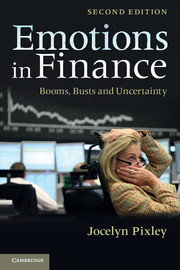Book contents
- Frontmatter
- Contents
- Acknowledgements
- Abbreviations
- Interviews
- Introduction
- 1 Modern money, modern conflicts
- 2 Corporate suspicion in the kingdom of rationality
- 3 Financial press as trust agencies
- 4 Required distrust and the onus of a bonus
- 5 Managing credibility in central banks
- 6 Hierarchies of distrust from trust to bust
- 7 Overwhelmed by numbers
- 8 The time-utopia in finance
- 9 Taming the god of opportunism
- References
- Index
Introduction
Published online by Cambridge University Press: 05 June 2012
- Frontmatter
- Contents
- Acknowledgements
- Abbreviations
- Interviews
- Introduction
- 1 Modern money, modern conflicts
- 2 Corporate suspicion in the kingdom of rationality
- 3 Financial press as trust agencies
- 4 Required distrust and the onus of a bonus
- 5 Managing credibility in central banks
- 6 Hierarchies of distrust from trust to bust
- 7 Overwhelmed by numbers
- 8 The time-utopia in finance
- 9 Taming the god of opportunism
- References
- Index
Summary
What is happening to trust?
This book started as a warning that uncertainty can never be beaten. TheUK/US credit crisis proved this longer-term thesis about money more thanI imagined, but it brings me no joy. The social problems magnify. Each crisisshows there is no coherence of the whole. Unseen and ignored as a rule, trustand confidence are strategies to stabilise money's uncertainties, but they alsocreate instability. In finance, uncertainty is never the ‘risk’ soclaimed. Trust can never be banished, for example through attempts to predictdefaults, because money is always uncertain.
Money is a promise with future benefits or dangers that can never, becauseunknowable, be calculated. But, no matter how often this is proven wrong in‘crisis’, the financial edifice is driven to speculate on theunknowable of whether prices will rise or fall. Trust and distrust in bankingpractices are at the core of money's infrastructure in the 400 years ofcapitalist development. These emotions are so impersonal that interest rates areone of many ‘indicators’ of trust or conversely distrust inmoney's abstract creditor–debtor relations.
The interminable efforts to ‘repackage uncertainty’ and so todamage trust, undertaken by the entire range of private and public financialinstitutions, continue, and fail rapidly. Each effort – to deny that trust isthe only means of coping with uncertainty – is short term. Trust makesimaginative futures possible. But the financial ‘sure thing’ isuntrustworthy, uncreative; these promises are made and sold with betrayal builtinto them – impersonal emotions that seek control. Bank defaults, 2008 bailoutsand 2010 austerity all express money’s uncertainties more deeply than theDotcom bust in my first edition. Way beyond the ‘hard money’ menwarring with Keynesians are social groups, economic sectors and states that winand lose after every irrational ploy to stamp out uncertainty. By this I meanrecessions or imposed unemployment, dangerous credit inflations and deflations,and state activity of saving the sector only to be damned by it. Money ispolitical.
Information
- Type
- Chapter
- Information
- Emotions in FinanceBooms, Busts and Uncertainty, pp. 1 - 7Publisher: Cambridge University PressPrint publication year: 2012
